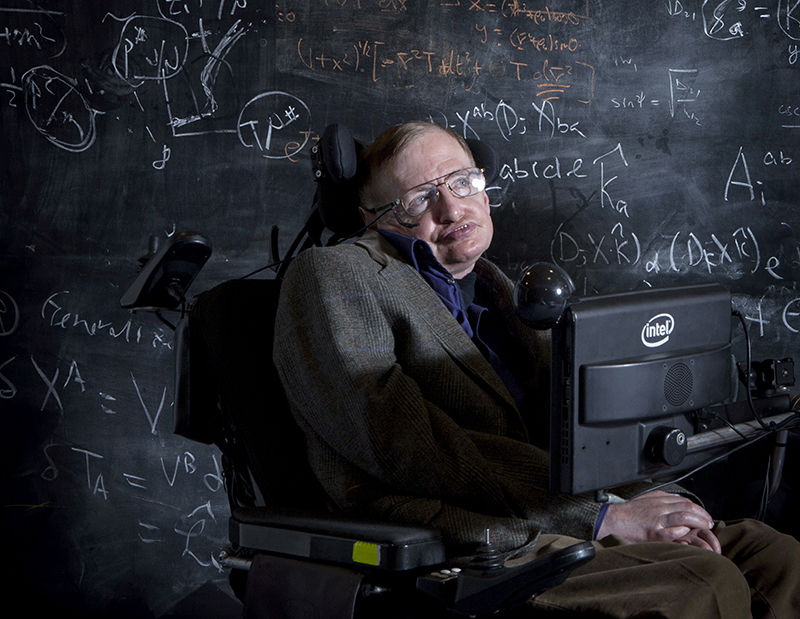Stephen Hawking deadh and story
Stephen Hawking, one of the most influential physicists of the twentieth century and perhaps the most celebrated icon of contemporary science, has died at the age of 76.
The University of Cambridge confirmed that the physicist died in the early hours of 14 March at his home in Cambridge, England.
Since his early twenties, Hawking had lived with amyotrophic lateral sclerosis (ALS), a disease in which motor neurones die, leaving the brain incapable of controlling muscles. Hawking’s health had been reportedly deteriorating; just over a year ago, he was hospitalized during a trip to Rome.
The British physicist was born in Oxford in 1942. He was diagnosed with ALS when he was 21, while a doctoral student in cosmology at the University of Cambridge. Hawking first realized that something was wrong when he went ice skating with his mother one day, he recalled in a speech on his 75th birthday celebration last year. “I fell over and had great difficulty getting up,” he told the audience. “At first I became depressed. I seemed to be getting worse very rapidly.”
Although physicians initially gave him just a few years to live, his disease advanced more slowly than expected. He went on to have an active career for decades, both as a theoretical physicist and as a popularizer of science. Still, Hawking progressively lost use of most of his muscles, and for the last three decades of his life was communicating almost exclusively through a voice synthesizer.
Over the years, Hawking became one of the most recognized names in contemporary science. His books, particularly A Brief History of Time, became blockbuster successes. He relished making cameo appearances on television shows such as Star Trek: The Next Generation, The Simpsons and The Big Bang Theory.
But scientifically, his name is most closely associated with the physics of black holes, which he began to study when they were still considered mere mathematical curiosities in Albert Einstein’s general theory of relativity. In the early 1970s, he began to investigate what quantum physics could reveal about the event horizon, a black hole’s surface of no return. Hawking shocked the physics world when he calculated that this surface should slowly emit radiation (soon to become known as Hawking radiation). Black holes were not truly black.
Stephen Hawking: A life in science
This emission, he reasoned, should ultimately lead the black hole to shrink and disappear1. Even more shocking to researchers was the fact that Hawking radiation should erase information from the Universe, in apparent contradiction to some of the basic tenets of quantum theory, as Hawking pointed out in 19762.
Perhaps because most of his work was of speculative nature and difficult to test experimentally, Hawking was never awarded a Nobel Prize. In 2016 some wondered whether he finally might get one, when Jeff Steinhauer, a physicist at the Technion-Israel Institute of Technology in Haifa, announced that he had found convincing evidence of Hawking radiation — not in an actual black hole, but in a laboratory analogue made of extremely cold atoms. However, some experts still consider those results inconclusive and many say that their relevance to true black holes is uncertain.
A more direct test of some of Hawking’s findings might yet come from the study of astrophysical black holes through gravitational waves, initiated by the US-based Laser Interferometer Gravitational-wave Observatory (LIGO). Hawking and others have linked the surface area of a black hole’s event horizon to its entropy, a measure of disorder. When interviewed by Nature’s news team in 2016 about LIGO’s first detection of gravitational waves from merging black holes, Hawking said that he hoped that future detections would be sensitive enough to confirm a prediction he had made in the 1970: that the surface area of the post-merger black hole should be larger than the combined surface area of the original objects — just as would be expected from entropy, which can never decrease. “I would like them to test my area theorem,” he said.
#science #hawking #death #study
Hi! I am a robot. I just upvoted you! I found similar content that readers might be interested in:
https://www.scientificamerican.com/article/science-mourns-stephen-hawkings-death/